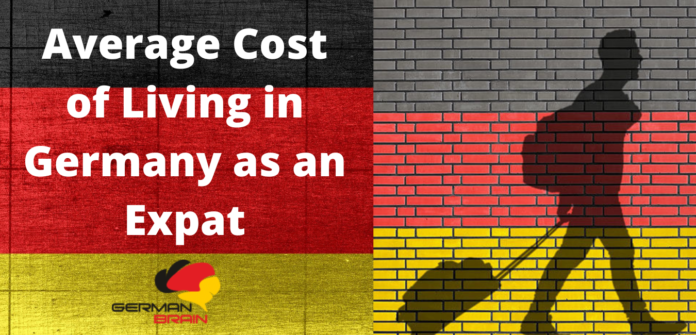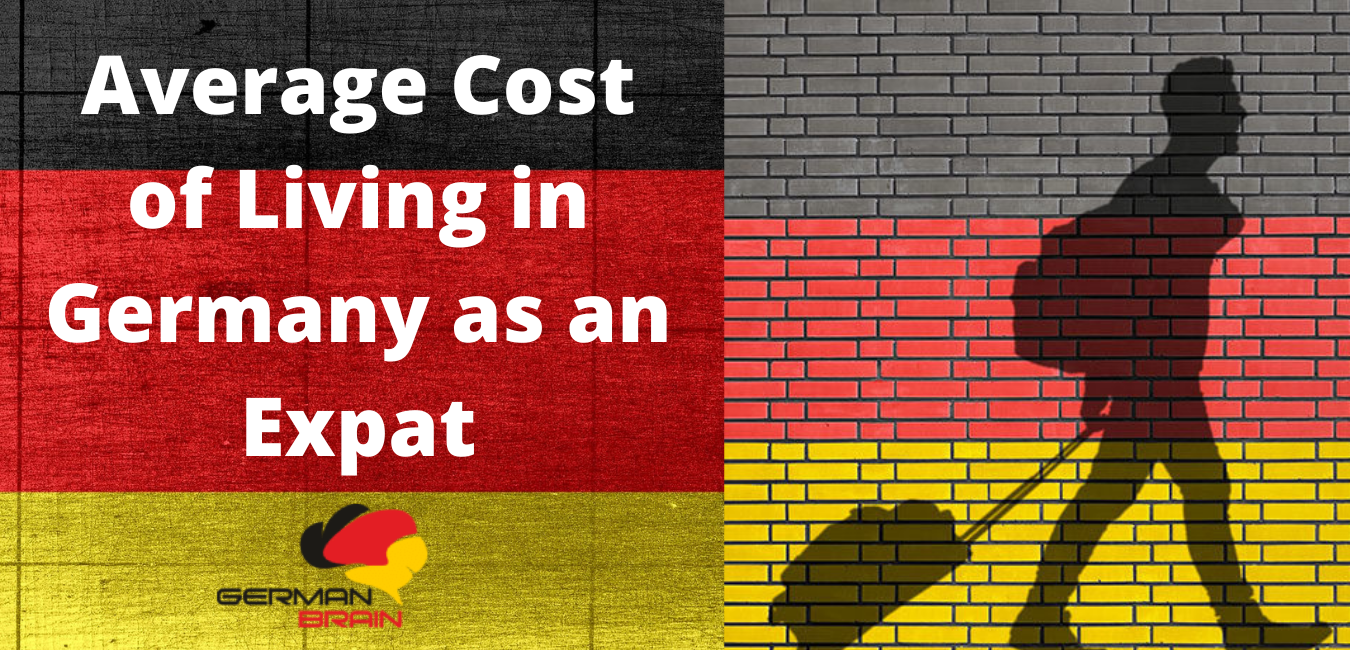
Table of Contents
Compared to some other European countries, Germany is not very expensive. The costs of food, housing, clothing, and cultural activities are slightly higher than the EU average. On average, students in Germany spend around 850 euros per month on living costs.
How do the costs come together?
The general, rough costs of living in Germany per month for a single person are as follows:
- Rent: from €300 (student halls or room in a shared flat) to €700+ (one-bed flat in the city)
- Utilities: €220 (inc. internet, mobile & TV)
- Travel: from €0 (students) to around €100
- Food & Drink: €150 to €200
- Health insurance: €105 (rate for long-term care for students in a public health insurance provider. For others, it can be more, but can also be partially covered by your employer and come directly from your gross paycheck, if you’re employed)
- Going out: from €50 to €150 (depending on lifestyle)
- Other: €20
- Total: from €850 to €1,500
The cost of living in Germany for a couple who share accommodation is about 50% more than this.
The largest expense is rent. All you need to do is live within your means and all shall be well. So, we are going to check the cost of living in terms of how much you’ll spend in form of rent in five big cities.
The cost of living will include as follows in the following cities:
Cost of Living in Hamburg, Germany as an Expat
Without a doubt, Hamburg has to be one of the most expensive cities to work and live in, if you don’t have a fat paycheck.
How high is the average rent in Hamburg, Germany?
What makes Hamburg an expensive city to live in is the rent rates which see tenants handing over up to 21.9% of their after-tax salary to tenants.
The rent rate is at €2,810 per square meter.
| Average rent in Hamburg | Prices (in €) |
| Private room | 886.97 € |
| Studio | 1,247.86 € |
| 1-room apartment | 1,657.55 € |
| 2-room apartment | 2,779.26 € |
To live in comfort – and not just to survive – you should reckon with about 820.20€ per month as a single person – without rent!
However, the city is busy and there are many job opportunities thanks to it being the only harbor for Germany.
People in Hamburg earn an average salary of € 3,491 gross
Therefore, in as much as you have the culture of hard work well inculcated in you, you’ll have nothing to worry about living in Hamburg. You can still live without straining with the remaining 80% of the salary.
| Leisure Time | Prices (in €) |
| Lunch in a normal restaurant | 10,00€ |
| Restaurant visit for 2 persons | 50,00€ |
| 2 theatre tickets (good seats) | 124.00 € |
| Cappuccino (normal) | 3,05€ |
| Water (0,33-liter bottle) | 2,02€ (watch out, most likely sparkling water!) |
Transportation
Good news: As a student, you will usually receive a semester ticket from your university for a low fee. Best to ask at your university!
For more information please refer: Cost of Living in Hamburg
Cost of Living in Stuttgart, Germany as an Expat
Stuttgart is the capital of the state of Baden-Württemberg in southern Germany.
The economy of Stuttgart, Germany
Stuttgart is known for its high-tech industry with strong ties to the automotive, electronics, engineering, and high-tech industry. The region currently has Germany’s highest density of scientific, academic, and research organizations.
Where to live in Stuttgart, Germany
Extremely dense but with a delightful flair, Stuttgart-West is an attractive place to live, very close to the city center. Sprinkled with markets, shops, cafes, theatres, and small parks, almost anything you need is within walking distance.
The transportation system in Stuttgart, Germany
Stuttgart has a fantastic public transportation system, which gets you anywhere you need to be, without necessarily having to use a car.
Accommodation in Stuttgart, Germany
Finding accommodation in Stuttgart at a reasonable price may be tricky, especially for students. However, the city hosts a variety of housing options which have more affordable prices in some neighborhoods and higher in others.
Rent prices in Stuttgart, Germany
- You will need an average of €625 per month for a single-bedroom apartment
- €1,300 per month for a three-bedroom apartment in the city center.
- € 500 per month single-bedroom apartment in the outskirts.
- €950 per month For a three-bedroom apartment in the outskirts
Is Stuttgart, Germany a Good Place to Work?
Stuttgart provides a broad range of fantastic job opportunities</strong> since it is home to several world-famous companies such as Porsche, Mercedes Benz, Bosch, and Bauknecht.
The automobile industry is the biggest employer in the city, but you can still find job opportunities in the banking and insurance sector as well as the construction industry. The rate of unemployment in this city is much lower compared to that of some of the leading cities such as Munich, and Hamburg.
Cost of Living in Berlin, Germany as an Expat
The cost of living in Berlin is just above the European average and yet the vibrant city is the cheapest capital city in Western Europe!
Anyone wouldn’t mind living and working in Berlin because it is a mixture of both urban and provincial culture. Moreover, it is a leading international education center and therefore the are many foreigners around.
What is the Average Cost To Rent in Berlin, Germany
How much money you need to pay depends heavily on the size of the apartment and the location. Living in Berlin means finding accommodation which will be one of your top priorities. Because it is such a large place, the city accommodates a wide range of tastes and budgets.
| Average rent in Berlin | Prices in € |
| Average rent in Berlin for private rooms | € 552 |
| Average rent in Berlin for apartments | € 1.09 |
Transportation System in Berlin, Germany
Berlin’s public transport system takes you from one corner to the other in no time at all. And if you are an enrolled student in Berlin, you can even get around for free! Most universities in Germany are part of a network that provides students with a semester ticket for a small fee.
Leisure time in Berlin, Germany
Now, on to the fun part of living: leisure. In Berlin, you can roughly expect these prices for your free time:
| Leisure time | Prices in € |
| Lunch out (meal including a drink) | € 11 |
| Dinner out (for 2 people) | € 28.00 |
| Theatre tickets (for 1 person) | € 41.50 |
| Cinema tickets (for 1 person) | €10 (on some weekdays it’s cheaper than on weekends!) |
| Coffee (flat white, of course with oat milk) | € 3.34 |
Is Berlin a good place to work?
In fact, the unemployment rate in Berlin is 9% while the average German unemployment rate is 5.3%. However, the city is still at the forefront of job creation.
Average Salary
The median average salary in Berlin is about 1,750 EUR per month after tax
There are still employment opportunities for ex-pats and locals alike though they may be quite difficult to find. Considering the population density of Berlin, there is competition for every type of job.
Cost of Living in Heidelberg, Germany as an Expat
Heidelberg is an international education center and thus has a high number of foreigners living within the area. Heidelberg is a city revolving around the university and scientific research, while also being a favorite among visitors for its riverside location and historic town center
Transportation in Heidelberg, Germany
Foreigners and expatriates living in Heidelberg will be able to drive legally using the driving license from their home country for up to six months. Carpooling is popular with people living in Heidelberg, especially with people that work or live together.
Job and work in Heidelberg, Germany
Heidelberg’s economy is based on different industries: high-tech, wind energy, aerospace, teaching – there are plenty of job offers for expats they can find online or in newspapers.
Employment in Heidelberg, Germany
Heidelberg’s two main economic sectors are services and industry, accounting for 82% and 18% of economic output respectively.
In the services sector, the main employer is tourism, which has historically been the largest part of the city’s economy.
Heidelberg’s largest industry is stationery, and it is home to the headquarters of some of the world’s major stationery manufacturers, including Lamy Pens.
Accommodation in Heidelberg, Germany
Because the city is small and the real estate market limited, the rent prices are very high there, even for a small room in a shared apartment. And while there are a lot of student dormitories, you have to go on a long waiting list in order to get a place. This is why many students live outside of Heidelberg: in Eppelheim, Neckargemuend, or Walldorf.
Cost of Living in Frankfurt, Germany as an Expat
Frankfurt is a leading international banking destination and it would be accurate to say that the expensive lifestyle is fueled by plenty of money circulation.
- Economy: Frankfurt is one of the leading financial centres in Europe.
- Inflation: -0.3% for Germany as of November 2020.
- Frankfurt Population: 5.6 Million (Metro) (2020 est.)
What is the cost of living in Frankfurt, Germany?
The cost of living for expatriates in Frankfurt as of October 2020 is high in comparison to other places in the world.
Frankfurt is 11.9% more expensive than Houston TX for groceries, 78.5% more expensive for household costs than Kuala Lumpur, and 96% more expensive for transport costs than Dubai.
Transportation in Frankfurt, Germany
Transportation in Frankfurt is one of the best in the world, and there is no need to own a car (unless you want to). The city has an excellent urban public transport infrastructure. You will also benefit from the German railway network. Finally, with Frankfurt Airport you can directly to most of the biggest cities in the world.
Accommodation in Frankfurt, Germany
There is a range of accommodation in Frankfurt and the price will depend on a number of factors, including the area one chooses to live in, the size of the property, and whether the property is furnished or unfurnished.
The city centre is rather expensive, but a lot of young expats who want to be close to the action opt to do house shares.
| Accommodation Type | Prices in EUR |
| Three-bedroom apartment in the city centre | EUR 2,020 |
| Three-bedroom apartment outside of city centre | EUR 1,470 |
| One-bedroom apartment in the city centre | EUR 1,030 |
| One-bedroom apartment outside of city centre | EUR 800 |
Shared accommodation is best for single expats on a tight budget. Monthly rent for a room in a shared apartment in the city center would be around €300 to € 750.
On the other hand, for those moving to Frankfurt with family, a furnished two-bedroom apartment would cost around €1800 to € 7200 monthly.
Average Salary in Frankfurt 2020
How much money does a person working in Frankfurt make?
A person working in Frankfurt typically earns around 4,050 EUR per month. Salaries range from 1,020 EUR (lowest average) to 18,100 EUR (highest average, the actual maximum salary is higher).




































